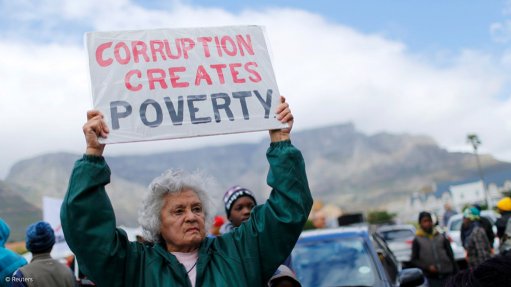New era of the silent majority
The 2021 local government elections have come and gone, and pundits have written column centimetres upon column centimetres about them. But the temptation to also weigh in has been too much for me.
The voter turnout was the lowest since the dawn of democracy – a paltry 33% of those whose names appear on the voters’ roll. One explanation, shared by the many talking heads that graced our telly screens in the aftermath of voting, is that most South Africans have lost faith in the country’s political parties. So, the argument goes, why endure the palaver of travelling to a polling station, stand in a queue for God knows how long and do whatever else a voter is required to do if, at the end of the day, those who are elected to public office do not bring about positive change in one’s life? But we will never know for sure if this is the reason for the voter no-show. Perhaps when 2024 rolls around the ballot paper should include a box at the bottom that gives voters the option to tick off ‘None of the above’.
If it is any solace, declining voter numbers are not peculiar to South Africa but are rather a worldwide phenomenon. But first things first – what is voter turnout? One definition, from the International Institute of Democracy and Electoral Assistance (IDEA), is the extent to which voters registered by electoral bodies, as well as those who have attained voting age but are not registered, exercise their right to vote. If we go by this definition, then the eight-million-odd voters who participated in the just-ended municipal elections equate to far less than 33% of eligible voters.
According to the World Bank’s ‘2017 World Development Report’, the global voter turnout rate had declined by over 10% during the preceding 25 years. The reasons, International IDEA surmises, are socioeconomic, political, institutional and personal. With respect to socioeconomic considerations, the Sweden-based NGO states: “Economic adversity negatively affects political participation because economic hardship can result in voter apathy and lead people to withdraw from politics and focus on meeting their basic needs.”
The political deterrents are multifaceted. First, where electoral contests tend to be close, citizens feel incentivised to vote, believing that doing so will have a high probability of influencing the final outcome. On the other hand, where the winner is always a foregone conclusion, the desire to vote is low. Second, where political parties have different agendas on tackling a specific challenge, citizens tend to vote for the party that best represents their views on the issue. However, nondivergent political party agendas are quite off-putting for voters. Third, the existence of numerous political parties might instill uncertainty among voters as to whether their ballot will influence the election result.
Needless to say, the voter turnout rate tends to be higher where electoral institutions are perceived to be credible, while the individual factors that influence citizens’ propensity for voting include level of education, political interest and sense of civic duty.
So, if the worldwide trend is anything to go by, South Africa should brace itself for a new era of the silence majority – a phrase popularised by former US President Richard Nixon in the late 60s. He said back then: “And so tonight – to you, the great silent majority of Americans – I ask for your support.”
A reference to citizens who don’t participate in the national discourse, this phrase later resurfaced in the campaigns of Ronald Reagan – the US’s President from 1981 to 1989 – and Donald Trump, the immediate past President. As many would know, there was indeed a great silent majority during Trump’s campaign for a second term, but they chose not to support him on election day.
The result was that he became the first single-term US President since George Bush Snr.Article Enquiry
Email Article
Save Article
Feedback
To advertise email advertising@creamermedia.co.za or click here
Press Office
Announcements
What's On
Subscribe to improve your user experience...
Option 1 (equivalent of R125 a month):
Receive a weekly copy of Creamer Media's Engineering News & Mining Weekly magazine
(print copy for those in South Africa and e-magazine for those outside of South Africa)
Receive daily email newsletters
Access to full search results
Access archive of magazine back copies
Access to Projects in Progress
Access to ONE Research Report of your choice in PDF format
Option 2 (equivalent of R375 a month):
All benefits from Option 1
PLUS
Access to Creamer Media's Research Channel Africa for ALL Research Reports, in PDF format, on various industrial and mining sectors
including Electricity; Water; Energy Transition; Hydrogen; Roads, Rail and Ports; Coal; Gold; Platinum; Battery Metals; etc.
Already a subscriber?
Forgotten your password?
Receive weekly copy of Creamer Media's Engineering News & Mining Weekly magazine (print copy for those in South Africa and e-magazine for those outside of South Africa)
➕
Recieve daily email newsletters
➕
Access to full search results
➕
Access archive of magazine back copies
➕
Access to Projects in Progress
➕
Access to ONE Research Report of your choice in PDF format
RESEARCH CHANNEL AFRICA
R4500 (equivalent of R375 a month)
SUBSCRIBEAll benefits from Option 1
➕
Access to Creamer Media's Research Channel Africa for ALL Research Reports on various industrial and mining sectors, in PDF format, including on:
Electricity
➕
Water
➕
Energy Transition
➕
Hydrogen
➕
Roads, Rail and Ports
➕
Coal
➕
Gold
➕
Platinum
➕
Battery Metals
➕
etc.
Receive all benefits from Option 1 or Option 2 delivered to numerous people at your company
➕
Multiple User names and Passwords for simultaneous log-ins
➕
Intranet integration access to all in your organisation


















